#Learning fluent japanese for beginners
Explore tagged Tumblr posts
Text
dude. starting to wish id gone with the teach yourself series for language learning vs the hugo in 3 months series
#now to be fair the edition i have is from the. 90s LOL and i chose it cos it had audio and the one thing im suffering with is listening comp#but. ive had a look at the teach yourself swedish edition i have (also 90s). and. god. it looks significantly better#ie more engaging (pictures LOL). more varied but also practical activities. a lot of relevant cultural info not mentioned in the hugo serie#and thats from a skim. the engaging part i will actually say IS important because the one thing youre fighting to do when learning#is actually retaining anything AND THEN being able to recall it/actually produce language#THAT SAID. the drive i had gotten those books from was actually taken down (hit with copyright infringement)#and the backup of that drive was also taken down#which is a massive shame and i hope op is able to get it back up eventually. there were a LOT of resources on there#that said i did keep a local copy of the swedish folder. no idea how id get that to anyone though cos the files are huge#i know its like. i can still DO the series LMAO#but im worried id start to do the thing i did with japanese. which is to keep engaging with like beginner level texts/courses#instead of focusing on actually like. progressing lol.#the vocabulary DID differ greatly from the skim though so i should take a look anyhow if not actually complete it#TO BE CLEARRR i did find the hugo book helpful. my only prior experience learning swedish before then was. du*lingo (🤮)#but like. ur obviously not getting 'fluent' in 3 months with the book alone lol
6 notes
·
View notes
Note
Helloooooooo
Pretty please can I get reader learning the blk boys language. (Like a year into learning it and they're pretty fluent) Then telling them they only know a few phrases. The boys messing with reader and later reader gets them back. I thought of Sae with Spanish, Rin with Japanese, and Kaiser with German.
I just read your post where reader gets lost and those 3 help them. I loved it. It was sooooo good. I feel like Kaiser would mess with reader hardcore.
“𝐛𝐢𝐥𝐢𝐧𝐠𝐮𝐚𝐥 𝐛𝐢𝐦𝐛𝐨 𝐛𝐞𝐡𝐚𝐯𝐢𝐨𝐫”

a/n: i can only speak japanese so the other two languages made me resort to AI 😭
english translations of each title: “baby girl, you understand that right?” (german), “i don’t understand, but tell me more” (spanish), and “i don’t know, but your voice is cute/wakannai demo kimi no koe kawaii” (japanese).
ft. kaiser michael, itoshi sae, itoshi rin
𝐤𝐚𝐢𝐬𝐞𝐫 𝐦𝐢𝐜𝐡𝐚𝐞𝐥 – “𝐛𝐚𝐛𝐲 𝐠𝐢𝐫𝐥, 𝐝𝐮 𝐯𝐞𝐫𝐬𝐭𝐞𝐡𝐬𝐭 𝐝𝐚𝐬, 𝐨𝐝𝐞𝐫?”
you sip your iced coffee slowly, perched on the edge of kaiser’s kitchen counter, pretending not to understand a single word he’s saying as he rifles through a drawer, muttering to himself in rapid-fire german.
“wo ist mein verdammter pass? (where is my damn passport?)” he grumbles. “er war genau hier, ich schwöre (it was right here, i swear)–”
you blink innocently. “what?”
kaiser turns, flashing you a sly grin. “you didn’t catch that?” he asks, far too casually.
you shake your head. “i told you, i only know, like... ich liebe dich and wo ist die toilette, and that’s about it.”
he places a hand dramatically on his chest. “you only know i love you and where’s the toilet? wow. romantic and practical.”
you giggle, but the second he turns back around, you narrow your eyes. you’ve been studying german for a year. you’ve aced listening comprehension. you just watched three episodes of a german show without subtitles. you could pass for a confused exchange student in berlin right now if needed. but he doesn’t know that.
and michael kaiser – cocky, annoying, too-pretty michael – needs to be humbled.
and so it begins with deliberate mistakes.
“hey, what does du bist mein schatz mean?” you ask sweetly one night while cuddling on the couch.
“it means you’re my treasure,” he replies, beaming.
you blink at him. “oh. i thought it meant... ‘you smell like cheese.’”
he chokes. “where the hell did you get that?!”
“i dunno,” you shrug. “tik tok?”
it spirals from there. kaiser starts testing you like a smug little menace. whispers things like “zieh dich aus” (take off your clothes) and then chuckles when you pretend to think he’s asking for snacks.
“you know, for someone who’s been in germany for months,” he says one morning, “you’re oddly helpless.”
“i’m cute. i don’t have to be smart,” you reply.
“fair point,” he nods.
until one day, you flip the script.
he walks in, phone in hand, ranting about some teammate being late to practice.
“weißt du, ich schwöre, ich bin von idioten umgeben (i swear, i’m surrounded by idiots),” he huffs.
you look up from the couch. “ja, das stimmt (yeah, that’s true).”
kaiser freezes mid-step. “what did you just say?”
you blink innocently. “oh. just agreeing. sounds like you’re surrounded by idiots.”
he squints, slowly lowering his phone. “you understood that?”
“i understood all of it,” you say, grinning. “especially the part yesterday where you told your coach i was hot. thanks for that.”
he sputters. “you! how long?!”
you lean in, voice low. “let’s just say... du bist nicht der einzige, der spielen kann, schatz (you’re not the only one who can play games, babe).”
his mouth drops open. you’ve never seen him so scandalized. so shook. so deeply, deeply humbled.
you win.
𝐢𝐭𝐨𝐬𝐡𝐢 𝐬𝐚𝐞 – “𝐧𝐨 𝐞𝐧𝐭𝐢𝐞𝐧𝐝𝐨, 𝐩𝐞𝐫𝐨 𝐝𝐢𝐦𝐞 𝐦á𝐬”
sae itoshi is obvious when he’s being a menace.
it’s the tiniest smirk. the smallest tilt of his head. and it’s always followed by a sentence in spanish that is way too fast and absolutely not beginner-level.
“perdón (sorry)?” you ask, batting your lashes.
he leans closer. “aw. too fast for you?”
you sigh dramatically. “you know i only know, like, five words.”
“and you choose to date a man who speaks spanish?”
“for the aesthetics,” you reply. “and the thighs.”
he laughs. “at least you’re honest.”
except here’s the thing.
you’ve been learning spanish in secret for a whole year. private classes. podcasts. novelas. everything. you just like watching sae get smug about it.
“te ves muy guapa hoy (you look really pretty today),” he says casually over breakfast.
you glance at him. “no idea what that means, but thank you.”
“mhm,” he hums, sipping his coffee, smug levels: critical.
so one day, when he mutters under his breath “dios, esta chica me vuelve loco (god, this girl drives me crazy)”, thinking you won’t understand, you grin.
“aw, i drive you crazy?”
his spoon clinks against the bowl. slowly, he turns. “you understood that?”
“mmmhm,” you say, leaning on your elbows. “also, i heard what you said on the phone with rin last week. something about how you’re ‘so whipped you’d move to mars’?”
he stares. “you–how long have you understood spanish?”
you raise an eyebrow. “suficiente para saber que eres un payaso (enough to know you’re a clown).”
he narrows his eyes. “so this is revenge.”
“maybe,” you chirp. “maybe i’ll just call your mom and tell her what you really said about her cooking.”
sae drops his spoon.
you win.
𝐢𝐭𝐨𝐬𝐡𝐢 𝐫𝐢𝐧 – “わかんない。でも君の声かわいい。”
you thought you could get away with it.
“sorry, i only know basic stuff,” you lie, twirling your straw in your drink as rin talks to the waitress in quick japanese.
he looks at you. “like what?”
“uh… konnichiwa? arigatou? and suki desu? that’s about it.”
he shrugs. “that’s enough.”
but you see it – the tiniest glint of mischief behind his deadpan stare. the itoshi brothers are quiet menaces, and rin’s no different.
it starts small.
he’ll murmur something under his breath while brushing your hair out of your eyes. or whisper something in japanese when he thinks you’re asleep.
“かわいすぎる (kawaisugiru/too cute),” he says one night. “うざいくらいに (uzaikuraini/annoyingly so).”
you pretend to be asleep. your eye twitches. he just called you annoyingly cute. and he thinks you don’t know.
interesting.
so, naturally, you begin collecting evidence.
“君は俺の (kimi wa ore no),” he mutters one day, tugging you close. you’re mine.
“hmm?” you blink.
“nothing,” he replies, far too smug.
you let it slide. for now.
but your revenge is poetic.
you wait until dinner with his teammates. they’re all chatting in japanese, and you just sit there, nodding along like you don’t understand a thing, until one of them jokes about rin being unusually soft with you.
“ほんと、彼女の前だけ甘いよな (honto, kanojo no mae dake amai yo na/seriously, he’s only sweet in front of her),” one of them says. rin snorts.
you glance up sweetly. “あ、そう?じゃあ、彼の前で甘くしようかな。(a, sou? jaa, kare no mae de amakushiyou kana/oh, really? then i’ll just be sweet in front of him too.)”
rin chokes. the entire table goes silent.
you sip your tea. “what? did i say it wrong?”
he turns to you, completely betrayed. “you speak japanese.”
“a little,” you shrug. “but i’m really good at understanding liars.”
he stares. “how long?”
“long enough to know you talk to my dog in a baby voice when you think i’m not home.”
you win.
© 𝐤𝐱𝐬𝐚𝐠𝐢
#blue lock#blue lock x reader#bllk#bllk x reader#rin itoshi x reader#itoshi rin x reader#itoshi sae x reader#sae itoshi x reader#michael kaiser x reader#kaiser michael x reader#bilingual bimbo behavior
594 notes
·
View notes
Note
may i ask what you’ve been using to learn japanese? No pressure to reply, I’m just curious and looking for potential learning resources :] (wow in hindsight the phrasing here looks weird. anyways i hope you have a lovely day :D)
Thanks for asking!
Mostly I learned spoken Japanese from watching anime and then my writing and reading was more formalized by taking classes in college. I cannot stress enough how important it is to learn from more formal sources than anime; I think there are a lot of nuances and formalities that you should know by default when interacting with people in the language that don’t come across clearly at all in just anime.
I do have a few useful apps for learning though!

Kana is good if you’re a complete beginner at the language. It drills you on hiragana and katakana, for reading, writing, and listening.
Todaii is good for practicing reading, but quite a jump in difficulty. If you’re on Todaii, you should be fluent with kana already; this is mostly a tool for learning context and pronunciation of kanji through texts. It has news articles and practice problems, with some having the kanji labeled with helpful yomigana.
Nihongo gets the gold star from me in terms of recommendations— I use it all the time! It’s just a dictionary, but it’s probably the best arranged and easiest to understand Japanese dictionary I’ve used. It’s also completely offline so you can use it without internet.
312 notes
·
View notes
Text
Japanese Linguistic Observations in Spy x Family - part 1
This is a post series I've been planning for a while and I've finally had the time to complete part 1! 😃 I may have mentioned here before that I got my B.A. in Japanese/East Asian Studies, and even though I'm not fluent, I know the linguistics of the language fairly well. So I thought it would be fun to examine the interesting aspects of the Japanese version of the SxF manga that aren't reflected in the English translation. It might also be an informative experience for those who don't know any Japanese to learn a bit about the language through SxF! I'll try not to get too technical with the linguistics and keep my explanations at a beginner's level.
-----
Part 1 - Twilight's "honne and tatemae"
One of the main themes in SxF is how many of the characters have secrets they want to hide, so they act a certain way in front of others in order to mask their true selves. Japanese has a word for this phenomena called 本音と建前 ("honne and tatemae").
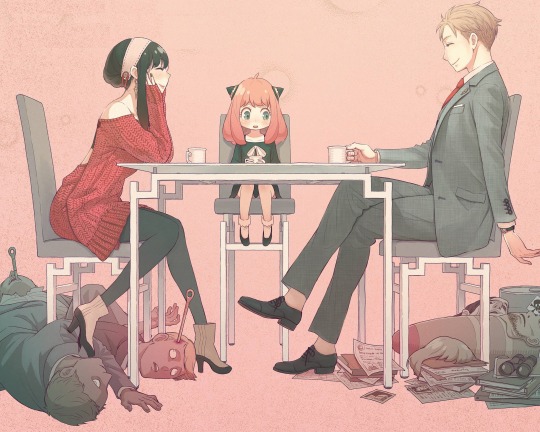
I remember learning about the concept of "honne and tatemae" during my Japanese college studies – a quick google search will yield a lot of publications on the topic and its relation to Japanese culture in particular. While the idea of hiding one's true intentions behind a fake facade can exist anywhere and is not something unique to Japan, it is enough of an occurrence in Japanese culture that there are specific words for it. The Wiki article has a basic but good definition of honne and tatemae, to quote:
A person's honne may be contrary to what is expected by society or what is required according to one's position and circumstances, and they are often kept hidden, except with one's closest friends. Tatemae is what is expected by society and required according to one's position and circumstances, and these may or may not match one's honne. In many cases, tatemae leads to outright telling of lies in order to avoid exposing the true inward feelings.
Sounds very much like the characters in SxF, doesn't it? Twilight especially, because unlike other characters like Yor and Anya, who simply have secrets they need to keep but don't create fake personas for themselves, Twilight does – the cheerful, friendly Loid Forger is a different person from the cold, calculating Twilight after all. Also unlike Yor and Anya, who speak the same way consistently no matter who they're talking to, Twilight uses different speech levels depending on which persona he's using and who he's talking to.
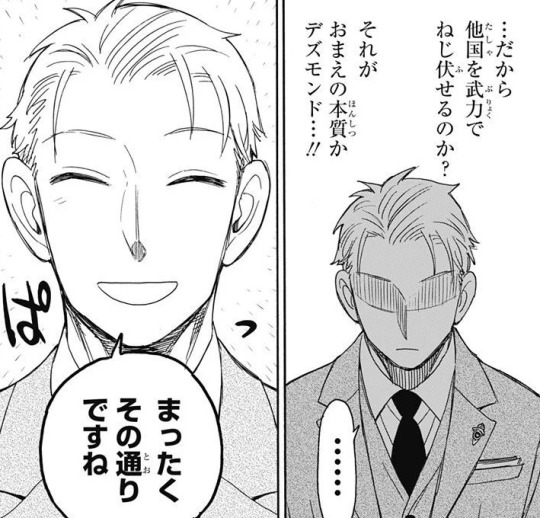
There are many different levels of speech in Japanese, ranging from super formal to totally crude. These speech levels are distinguished mostly by the pronouns the speaker chooses to use for themselves and who they're speaking to, as well as how they choose to conjugate the words they use. For example, 座ってください (suwatte kudasai), 座って (suwatte,) and 座れ (suware) all mean "sit," as in, telling someone to sit down. But the tone being conveyed is different: the first one is polite, the second one is casual, and the last one could be seen as rude if you're not using it with a close friend/family member.
As Twilight, he uses casual speech with the masculine and less polite pronoun 俺 or オレ (ore). This is the speech he uses when talking to a fellow spy like Fiona, and for his own inner thoughts.
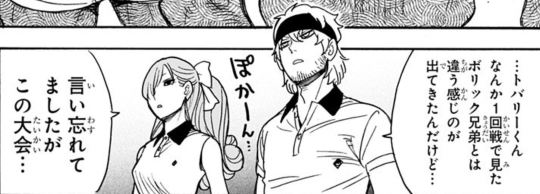
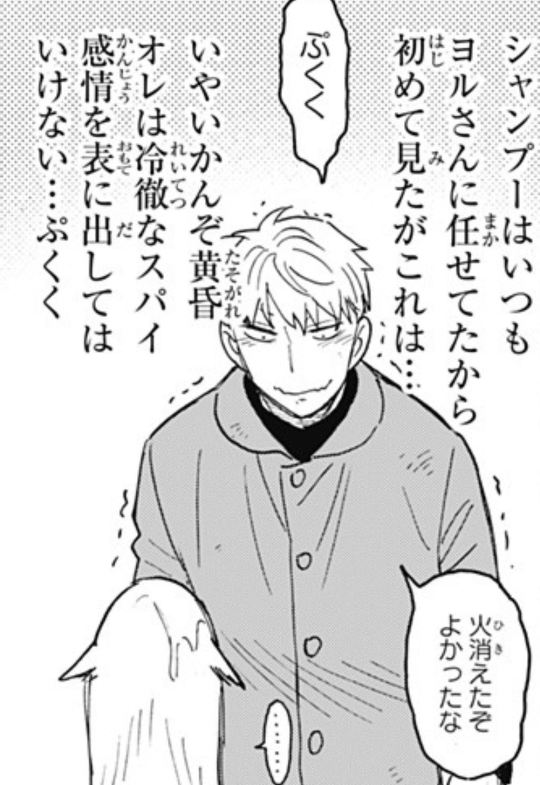
As Loid Forger, he uses the polite 敬語 (keigo) speech, which is basically comprised of using the -ます (-masu) conjugation for verbs and the "to be" verb です (desu). He also uses the pronoun ボク or 僕 (boku), which is the standard male pronoun and more polite than "ore." He uses keigo to address pretty much everyone who doesn't know his true identity. When talking to a higher-up like Sylvia, he'll still use "ore" but will use polite speech instead of casual speech.
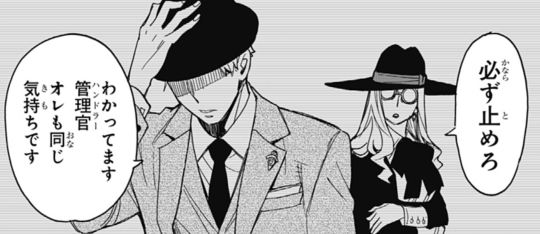
Anya is an exception to this: with her, he uses his most casual speech, the same as he uses with Franky.
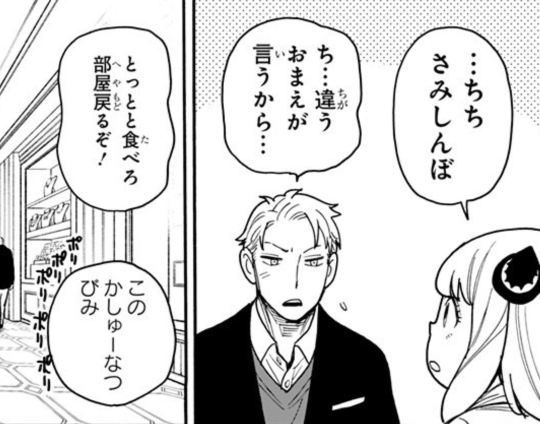
I discussed a bit about this in part 24 of my Twiyor analysis posts, but this could be because Anya is a little kid, so he doesn't feel the need to put on any airs with her (same with Bond, whom he also uses casual speech with).
An interesting side note is that, as a child, Twilight used the pronoun "boku" but then changed to "ore" as soon as he became an adult/soldier.
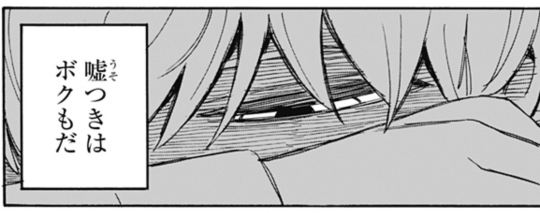
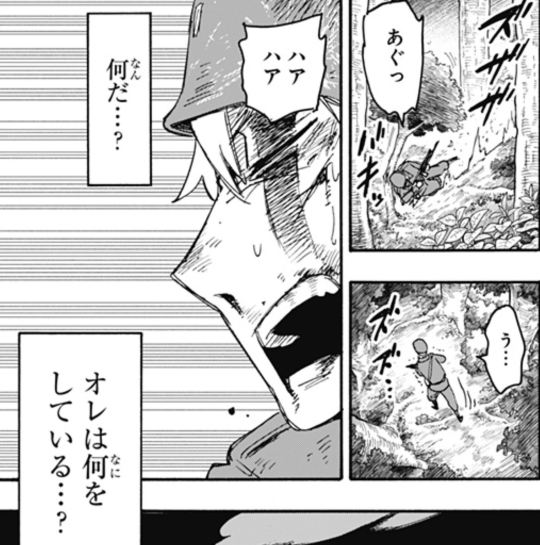
Another aspect of keigo, besides using the more polite forms of pronouns and verb conjugations, is putting the honorific さん (san) after people's names. Twilight does this all the time with Yor, as she does with him. However, he switches to casual speech and drops the "san" part in her name when addressing her in front of people who (supposedly) believe they're a real married couple, such as Yuri and Fiona – because it would be weird for a real couple who have been married for a year to address each other in such a formal way, especially the husband. In the below panel when Fiona visits them, he's calling her "Yor" instead of "Yor-san" and using casual speech instead of keigo.
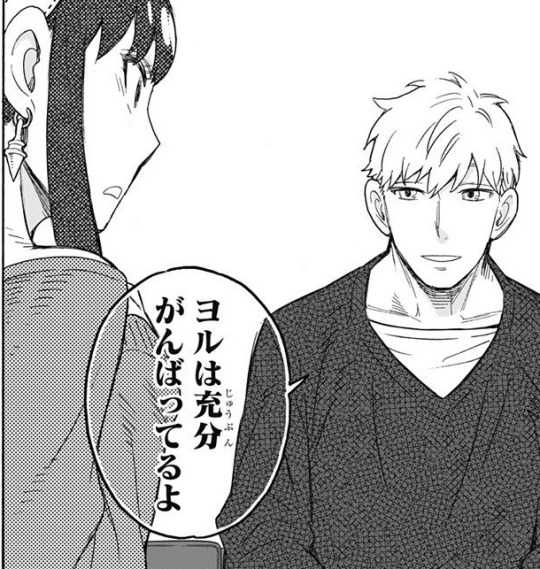
Oddly in these situations, while he uses just "Yor" when addressing her directly, he still calls her "Yor-san" when talking about her. During Yuri's first visit for example, he calls her "Yor-san" when telling Yuri how much Anya loves her (talking to someone about her) but then calls her just "Yor" a few moments later when telling her that he'll clean up the spill (talking to her directly). It's strange to me that he wouldn't just consistently use "Yor" whether he's talking to her or about her in these situations...I'm honestly not sure if he does this intentionally or if he just slips up since he's so used to using "Yor-san" in her presence.
*UPDATE* Thank you to @dentedintheworld-blog for enlightening me with the below reply about this!
"In Japanese, when speaking to your spouse's family about your spouse, you address her/him by attaching "san" her/his name out of respect for her/his family. This is also to show her/his family that you respect your spouse. That's why Loid calls Yor with san when he talks about how much he loves Yor to Yuri."
That definitely makes sense for why Twilight switches between "Yor" and "Yor-san" in these situations.
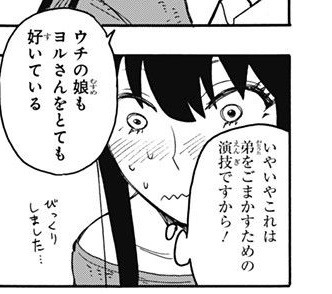
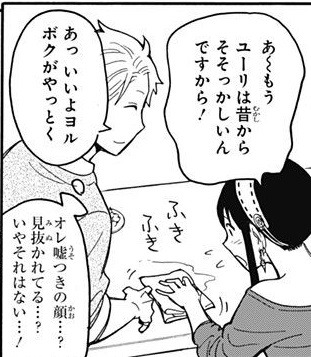
Regardless, this is why the scene in chapter 86 is so significant – when Yor isn't present, there's no reason for him to refer to her as "Yor-san," especially in front of a fellow spy like Fiona who knows he (supposedly) shouldn't have any feelings for her. Yet, even after he just called Yuri by his full name "Yuri Briar" a moment before, he doesn't do the same for Yor and continues to call her "Yor-san" here, much to Fiona's dismay.
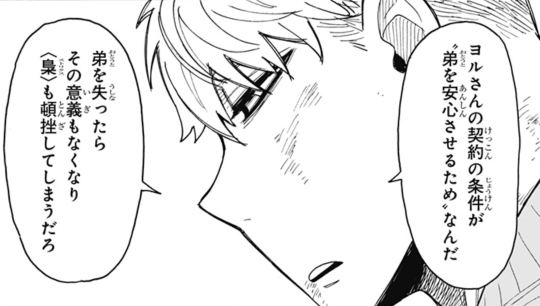
In the same chapter, it's also significant that he uses "ore" when addressing Yor directly in his thoughts. Even though he's not speaking out loud, I believe this is the first time he's speaking directly "to" her as Twilight and/or his true self and not as Loid Forger.
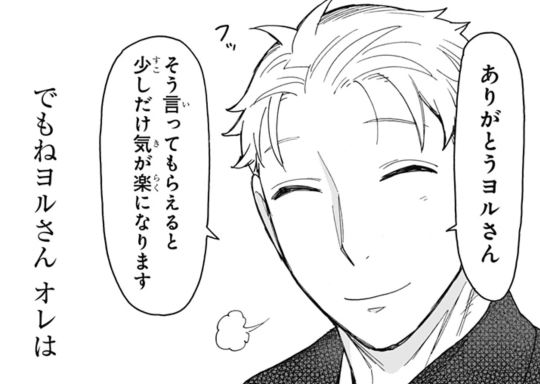
But despite all this, I think that both Loid Forger and Twilight are tatemae…they're both masks to hide the person he truly is. The person who fondly talked about his mother to Yor on the park bench, the person who genuinely expressed gratitude for her sacrifice when leaving the resort island, the person who refused to kill Yuri in a life-or-death struggle because he knew it would hurt her…that's his actual honne. But of course, the ongoing conflict of the series is that he has yet to realize this. He won't even show his honne to his closest friend, Franky. Seems like it mostly comes out in dribs and drabs during his interactions with Yor...no surprise there, lol. The man is certainly a work in progress. When he finally starts letting his "honne" show, I'm curious what form of speech he'll adopt.
-----
Continue to Part 2 ->
#spy x family#sxf#spy family#spyxfamily#loid forger#twiyor#sxf spoilers#sxf manga#sxf manga spoilers#sxf analysis
748 notes
·
View notes
Text
Hi, DGM fandom! I'm jeidafei. You may have seen me in Kougeki-scans' scanlation of D.Gray-Man.
I know Kougeki releases have been delayed for these past few chapters. And people have taken to releasing their own translations on Reddit and MangaDex as early as a few days after the Japanese release. We at Kougeki have asked people to wait if they could. People have told us to, basically, go d*e.
And of course, you are perfectly entitled to say so. You are perfectly entitled to release your own translations and not wait. After all, we at Kougeki are just fans of D.Gray-Man, similar to you. We have zero claim over the series.
I normally stay out of the fray when it comes to quarrels with these 'snipers' until now. When I saw the quality of the translations some of these people are putting out.
(Specifically, Chapter 250 on MangaDex)
Japanese is a difficult language. D.Gray-Man is a difficult manga to translate due to its ongoing status, complex nature and plot twists. I have made mistakes myself that others have pointed out. I have my own interpretations that might be different. I readily forgive mistakes I understand are due to the complex Japanese grammar, and the confusing mysteries of the D.Gray characters.
But these are not it. These are just blatant laziness and lack of basic knowledge of even the most recent developments in D.Gray-Man. Or even simple logic. These are the results of people dishing out sub-par work quickly just to get the most exposure possible.
So while we wait for Kougeki's version, I am going to point out these egregious mistakes. We need transparency so that going forward, you can make your own decisions on whether it is speed or accuracy you are looking for.
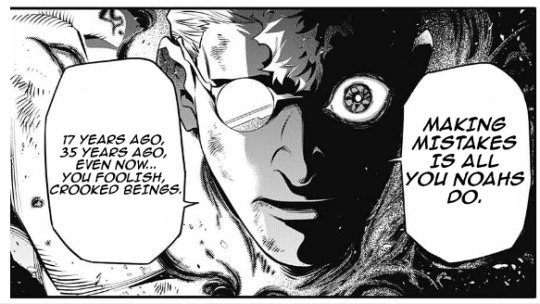
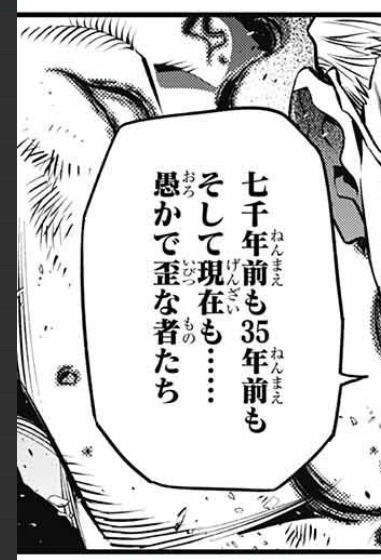
The original Japanese text says "7,000 years ago" (七千), not "17 years"(十七). A difference any beginner Japanese learner would notice. Even most D.Gray-Man fans without Japanese knowledge would probably realize something is off based on what we know of the story so far.
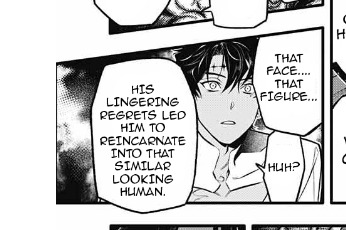
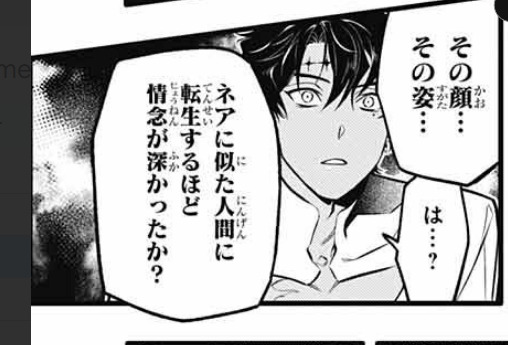
The original text says "Do(es) the passion/sentiments run so deep, you must reincarnate into a human who resembles Nea?" (the word 'regret' is simply not there). I think 'passion' or 'sentiments' are more compatible here, considering earlier theories about Tyki, the Noah of Pleasure.
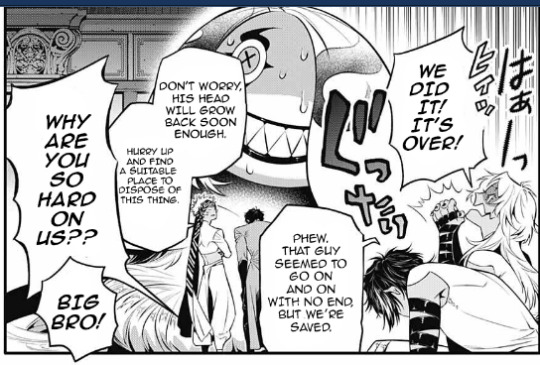
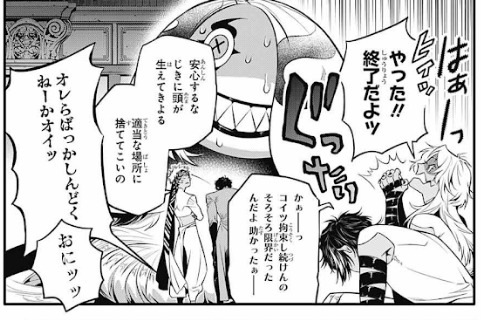
Jasdevi is saying they were at their limits anyway and wouldn't be able to keep restraining Apocryphos for long. When Wisely orders them to dispose of Apo, they scream "Oni!" (Demon) which is quite similar to "Onii-san" (Elder brother), but most people would probably know which one is more fitting in this scenario, even without Japanese knowledge.
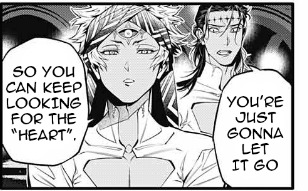
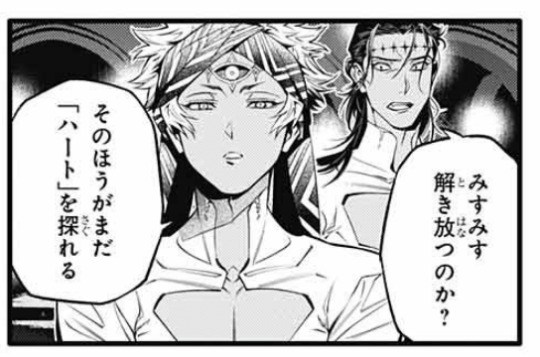
When Desires asks Wisely if he is just going to set Apo free like that, Wisely explains that this way, Apocryphos (not Desires or Wisely as in the translation), can keep searching for the Heart for them. Again, basic story knowledge.
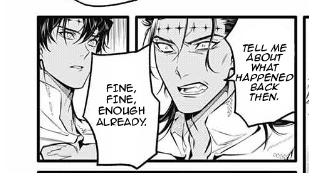
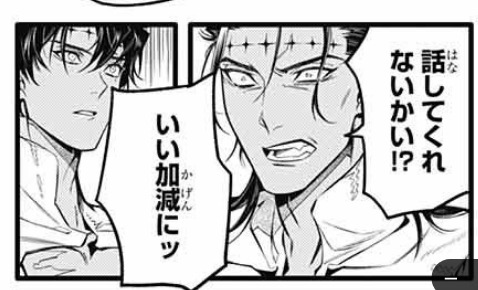
Wisely didn't say "Fine, enough already"; this bubble is a continuation of the earlier bubble, spoken by Desires. Together, he is saying "Wouldn't you just spit it out already!?"
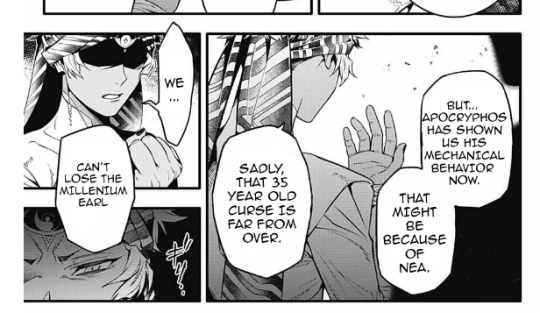
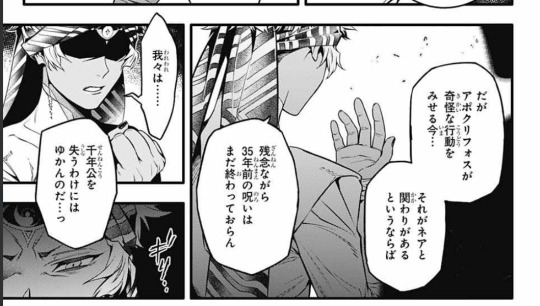
In Japanese, many words sound the same and the meaning can only be determined by context or the Chinese characters (kanji) used. In this case, "kikai" can mean either "machine" (機械) or "opportunity" (機会) or "strange" (奇怪), among a dozen others.
Yes, it's difficult, I know. But, you see the kanji. You know the context. I'm sure you can take a guess.
There are a couple more minor mistakes (ones that don't impact your understanding of the story too much). But I'm just going to leave you with one more, the most conspicuous mistake:
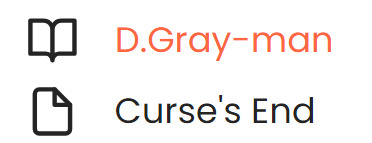

The chapter is named "Curse's End" by this translator. Actually, it's the opposite in Japanese. "Owaranu" is a form of "Owaranai" which means "not ending", which fits the revelation of this chapter by Wisely that their 35-year curse has yet to come to an end.
So, there you have it.
As you can see, I'm not shaming people for not being as fluent in Japanese. Not everyone can dedicate almost two decades to learn a language. As I have pointed out, most of these mistakes are rookie-level, and should have been picked up in double-check if that someone is familiar with D. Gray-Man at all. With these nigh unforgivable mistakes, even Deepl and Google Translate are more accurate.
This is a matter of someone not giving enough of a sh*t, plain and simple.
I'm also not gatekeeping scanlation whatsoever. I'm just pointing out the mistakes and actual text because the fandom deserves to know. With the localization drama going on, it proves faithfulness to the actual text and accuracy matters.
Of course, anyone has the right to put out their translation. And I have the right to point out whether they can be trusted. I'm not passing judgment. I'm just providing evidence so the bystanders can decide for themselves.
Lastly, from the bottom of my heart, I thank everyone who has supported the work of Kougeki Scans and waited for our release. I apologize for the delays. We're working on the latest chapter and will release 249 and 250 very, very soon.
265 notes
·
View notes
Note
heyyy.. I’ve been learning Japanese because I’m very interested, I’ve only been using Duolingo so far and I’m not satisfied with it for a number of reasons
anyway do you have any resources you’d recommend for a beginner level in Japanese? I know the entire hiragana alphabet, including sounds like “pu” and “gi” (I can’t figure out the Japanese keyboard yet lmao)
Hi! I'm very flattered you'd come to me! Please keep in mind I do not have a degree in Japanese nor English or any Language Teaching, so this is just advice from a normal guy.
Firstly, it was a good idea to ditch Duolingo. Duolingo is good for learning the JP alphabet, or - and if you don't care/don't want to become fluent - if you just need to learn a handful of phrases to make your Summer trip to Japan survivable. If you wish to become fluent though, it's a really awful tool. For one big reason:
There are no 1:1s in language.
Put simply...there is no "English translation" to any given Japanese word. This is true of any language, I think - not just ENG <--> JP. Sure, some simple nouns can be reliably translated with accuracy - りんご ringo means "apple", or 犬 いぬ inu means "dog". But even then, context matters. There's idioms, sayings - and when you get to verbs, more complex nouns, adjectives...there simply is no 1:1 anymore.
This is why we get translations like Danganronpa which read (70% of the time) like they looked up the word in a JP to ENG dictionary and figured that must be it.
For example... "zetsubou" , "despair", doesn't actually mean despair, really. The way it's used in Japanese is much more common/versatile than how it is used in English. Really think about it. How often in day to day normal conversation do you hear the word despair?
In Japanese, 絶望 ぜつぼう zetsubou is sort of like...misery, negativity, the absence of any feeling of things will be good or okay. This makes it far more common in Japanese natural dialogue.
So please keep that in mind with every word you learn! Learn the feeling, write down as many example sentences you need to help you with it.
This may feel daunting, and it's okay to rely on basic definitions as a beginner if you need to. Everyone starts somewhere. But it's something to keep in mind.
Elsewise, I think toddler cartoons are actually good. Cartoons made for babies and toddlers are designed to help them learn basic things, such as colors, shapes, being nice...etc. Because of the simplistic nature, small words are used, speech is usually slower, and words are repeated consistently. Even just sitting down every hour once a week to watch a toddler show in Japanese is helpful.
The Japanese dub of Bluey and Peppa Pig are very good. Also available (and my personal favorite) is Paboo and Mojies. If you want some material for kids but not toddlers, NHK for School is good.
Watching the Japanese Dub of a show you know like the back of your hand (preferably a kids' show for easier to understand dialogue) is great too, as you can hear how the sentence gets translated into Japanese. The MLP 5 movie is great in Japanese, and I don't know much about Miraculous Ladybug in English, but I caught it on JP Disney Junior a few times and thought it was fun, and I think if you are able to understand some of the toddler shows with relative ease, these would be good places to move to.
Toddler shows are also careful to generally keep the words spoken normal since kids will likely emulate them. It helps keep you from talking like an anime character.
When it comes to reading, little kid books with Hiragana are good, but manga is actually helpful! Manga uses Kanji, but includes Furigana by the Kanji so you can see how to say it. The Yotsubato Manga in Japanese is a good one to start with. You can look up the words you find in a dictionary.
If you need discipline and can't learn without deadlines and such, a language school may be good. While Japanese textbooks can often be misleading for English learners, it's not necessarily incorrect info, and if you need the school environment, then I'd say the pros outweighs the cons.
Also, don't be afraid to use MTL for help, to look up words, and to google in Japanese.
Also for Hiragana and Katakana, this is a good site. I know you already know Hiragana, but just in case.
Watching Japanese vlogs and YT videos are a good way to hear natural Japanese as well. Finding people who know Japanese to talk to is important for practicing your speaking skills as well.
I hope this helps at all!
33 notes
·
View notes
Text
It's so funny to me that Kaoru is the only fully monolingual person in UNDEAD when his VA speaks fluent English asdfghjkl.
For reference:
Rei: Japanese, Japanese Sign Language (translated for Adonis in Nightless City Live), English (studied abroad in London, shown in Operetta), possibly a bit of Romanian and/or Mandarin (family from Romania, spent time in Shanghai).
Adonis: Japanese, Japanese Sign Language (started learning to communicate across languages in the Special Music Zone), his home country's language (likely Arabic), English (teaches Souma).
Koga: Japanese, Japanese Sign Language (he's a bit more beginner than the other two but is learning from Adonis and can speak some).
Kaoru: Only Japanese and whatever he's picked up from anyone else lol.
Also, fun fact, but Arashi is the only monolingual one in Knights as well! Tsukasa and Ritsu speak English and Izumi and Leo speak Italian. Her seiyuu (Kitamu) is monolingual as far as I know tho lol.
#ensemble stars#enstars#ensemble stars music#enstars undead#kaoru hakaze#rei sakuma#adonis otogari#koga ogami#koga oogami
136 notes
·
View notes
Text
SONA’S OFFICIAL PROFILE ✰


Shin So-na (Korean: 신소나; born November 28, 2000) is a South Korean singer and dancer under SM Entertainment. She is a member of the South Korean co-ed group NCT and its subunits NCT U and NCT DREAM.
✰ NCT MENU ✰ SONA’S MASTERLIST

╭┈──── ◌ೄ◌ྀ ˊˎ
╰┈➤ ❝ BASIC INFO !
BIRTH NAME. Shin So-na (신소나)
NAME MEANING. Her name was suggested to her parents by her aunt. The meaning is unknown.
NICKNAMES. Naya (나야), Princess Sona (소나 공주)
DATE OF BIRTH. November 28, 2000
PLACE OF BIRTH. Ansan, Gyeonggi-do, South Korea
HOMETOWN. Ansan, Gyeonggi-do, South Korea (2000–2004), Tokyo, Japan (2004–2012)
ETHNICITY. Korean
NATIONALITY. South Korean
CITIZENSHIP. South Korean
FAMILY. Shin Seok-dong (father, 1967), Lee Eun-seo (mother, 1970), Lee Ga-yeon (aunt, 1975), Shin So-hyuk (brother, 1998), Shin So-jun (brother, 2004)
LANGUAGES. Korean (native, Gyeonggi dialect), Japanese (fluent, Tokyo dialect), English (beginner)
BLOOD TYPE. B+
WESTERN ZODIAC SIGN. Sagittarius
CHINESE ZODIAC SIGN. Dragon
GENDER. female
PRONOUNS. she/her
ROMANTIC AND SEXUAL INTERESTS. undisclosed
EYE COLOR. brown
HAIR COLOR. black
HEIGHT. 170cm (5’7”)
DOMINANT HAND. right
PIERCINGS. 2 in total; left earlobe (1), right earlobe (1)
TATTOOS. 1 in total; right wrist
MEDICAL CONDITIONS. chronic insomnia, seasickness
ALLERGIES. cat fur
VOCAL TONE. Kwon Eunbi
RAP STYLE. TWICE’s Momo
DANCE STYLE. aespa’s Ningning
╭┈──── ◌ೄ◌ྀ ˊˎ
╰┈➤ ❝ CAREER !
OCCUPATION. K-pop Idol
STAGE NAME. Sona (소나)
NICKNAMES. Charisma Genius, Lucky Sona
COMPANY. SM Entertainment (2013–present)
TRAINING PERIOD. 4 years 10 months (May 2013–March 2018)
DEBUT DATE. 14 March 2018 (NCT, NCT U), 3 September 2018 (NCT DREAM)
YEARS ACTIVE. 2014–present
GROUP. NCT (2018–present)
SUBUNITS. NCT U (2018–present), NCT DREAM (2018–present)
POSITIONS. Vocalist, Dancer (NCT), Lead Vocalist, Lead Dancer (NCT DREAM)
REPRESENTATIVE EMOJI. 🦇/🍀
REPRESENTATIVE COLOR. Royal Blue
SOLO FANDOM NAME. Haengwoonies (행우니즈)
ROLE MODEL. Girls’ Generation’s Taeyeon, TVXQ!’s U-Know Yunho, SHINee’s Jonghyun
SIGNATURE.

╭┈──── ◌ೄ◌ྀ ˊˎ
╰┈➤ ❝ RANKING !
10 - outstanding, 9 - excellent, 8 - very good, 7 - good, 6 - above average, 5 - average, 4 - below average, 3 - weak, 2 - very weak, 1 - never learned
STAR QUALITY. 9.5/10
VISUALS (KOREAN BEAUTY STANDARDS). 9/10
VOCALS. 2018: 7.5/10 2024: 9/10
RAP. 2018: 1/10 2024: 3/10
DANCE. 2018: 5.5/10 2024: 8.5/10
STAGE PRESENCE. 2018: 7/10 2024: 8.5/10
VARIETY SHOWS. 2018: 4/10 2024: 7/10
PUBLIC SPEAKING. 2018: 8/10 2024: 9.5/10
FAN SERVICE. 2018: 6/10 2024: 9/10
MEDIA TRAINING. 2018: 7/10 2024: 9.5/10
SONGWRITING. 2018: 1/10 2024: 6.5/10
PRODUCING. 2018: 1/10 2024: 4.5/10
CHOREOGRAPHING. 2018: 5/10 2024: 6/10
ACTING. 2018: 5/10 2024: 8/10
MODELING. 2018: 7/10 2024: 9/10
LEADERSHIP. 6.5/10
TEAMWORK. 9/10
DISCIPLINE. 10/10
EMOTIONAL RESILIENCE. 7/10
TIME MANAGEMENT. 9/10
╭┈──── ◌ೄ◌ྀ ˊˎ
╰┈➤ ❝ PERSONALITY !
MBTI TYPE. INFJ
MORAL ALIGNMENT. lawful neutral
Sona is one of the most charismatic people you’ll ever meet. Her first impression is confident, mysterious, friendly but reserved, and slightly intimidating. She is very proper and aware of how people perceive her; on the surface, she seems perfect in an almost robotic way.
Sona is a master at socializing. She has excellent social skills, can carry any conversation, and always knows when and how to say something. Because of the principles her mother embedded in her from a very young age, Sona is extremely aware and socially appropriate; it's near impossible to catch her acting impolite or unwelcoming, even though privately she is quite judgmental. She likes to be in control of her interactions, although she doesn't feel comfortable being a leader. Sona is an observer; she is socially sharp and interacts with people in a very calculated way. Because of that—whether consciously or not—she might be a little manipulative at times.
Although she thrives in social settings, Sona is an introvert at heart. She is really good at playing extrovert; she is adaptable in this sense but can feel drained if she spends too much time around people. Despite this, she feels uncomfortable alone in public.
Sona's emotions are big, deep, and often overwhelming. She became especially sensitive and emotional as a teenager due to puberty and her struggles as a trainee. She cried very often and had frequent emotional outbursts, mainly out of anger and frustration. As she grew up, she became more emotionally stable, but traces of this phase are still found in her personality. To this day, Sona struggles with anger; if it's sudden and overwhelming, she's likely to have an outburst, and if it slowly builds up, she turns passive-aggressive. When things gets tough, she tends to withdraw into herself and isolate. She needs a lot of time, reflection, and a stable environment to navigate her feelings. However, she is aware of those issues and is actively working on understanding and improving herself.
Growing up in a family with a belief that you have to seem perfect at all times made Sona overly image-conscious and guarded. She only lets her real personality show to people she is close to, and even then, she acts a certain way around those people. She goes to great lengths to make sure people only see her "good" parts. She thrives on routine and structure. She is very organized; she meticulously plans everything and hates when plans change at the last minute. She is something of a control freak.
Sona's biggest flaws are her extreme perfectionism and inability to let go. She picks apart every little thing she says and does just so people can view her as "perfect". She has carefully curated an image of herself and set up an impossibly high standard that she refuses to let go of. She is too serious about herself and takes things too personally. She doesn't allow herself to be human enough, and while it makes her incredibly disciplined, ambitious, and persevering, it makes her spiral into self-destruction and self-sabotage. When the extreme pressure she puts on herself becomes too much to handle, she starts to get in her own way and ruins things for herself. She is her own worst enemy.
Sona's personality makes her an incredible idol. Professionalism is one of her signature traits—she treats her jobs very seriously and is deeply sincere about it, which she is also highly admired for. She presents a cool, calm, mysterious, and intriguing image. In variety shows, she is unexpectedly witty and slightly unpredictable. She is known and praised for her carefully crafted image and attitude toward idol life. Fans view her as very private but very sincere and dedicated. Although her behavior was especially careful at debut, she slowly reveals more and more of her real self as the years go by. Her mysteriousness is what often draws the fans in.
Her personality creates an interesting dynamic with NCT DREAM. She is on the quieter side and likes to observe, but is always somehow involved in the chaos that happens. She is always engaged, even if she doesn't say anything, and her occasional comments make everyone lose it. Her relationships with the members vary from calmer to more intense, but she gets along with everyone. Behind the scenes, she brings emotional awareness to the group. Despite joining later, she is an essential member.
Sona's performances are versatile and very satisfying to watch; she is subtle, consistent, and very charismatic. She can pull off any concept, but she shines the most in songs that require confidence, precision, and emotional expression. There's a special glint in her eyes every time she performs that makes people remember her.
Sona is an idol who leaves you wanting more. She is viewed as polite, proper, and easy to admire, but once someone sees through her, they meet an entirely different person.
PERSONALITY TRAITS. adaptable, ambitious, calculated, charismatic, composed, disciplined, emotional, family-oriented, guarded, hardworking, image-conscious, introverted, judgmental, loyal, observant, organized, perfectionistic, persevering, polite, private, professional, proper, self-aware
STRENGTHS. aware of how people perceive her, socially intelligent, well-mannered, loyal and caring to people close to her, works on self-improvement
WEAKNESSES. manipulative at times, has slight anger issues and controlling tendencies, self-destructive, overly concerned with appearance and people’s opinions, struggles with letting go
HABITS. touching her neck, adjusting her necklace/neckline, sitting with legs crossed, journaling before bed, sitting and standing with straight posture, texting while walking
FEARS. thunderstorm, losing control, loneliness
LOVE LANGUAGE (GIVING). quality time > words of affirmation > gift giving = acts of service > physical touch
LOVE LANGUAGE (RECEIVING). words of affirmation > quality time > gift giving > physical touch = acts of service
ATTACHMENT STYLE. anxious-avoidant
HOBBIES. journaling, karaoke, playing golf, watching dramas
LIKES. dogs, eating at luxury restaurants, Fast and Furious movies, hiking, hot baths, naengmyeon, NewJeans’ music, parks, piña colada, red wine, romance dramas, spaghetti, sprite, watermelon, wearing sunglasses
DISLIKES. being outside in rain, last minute changes, mosquitoes, sudden physical touch, white chocolate
╭┈──── ◌ೄ◌ྀ ˊˎ
╰┈➤ ❝ HISTORY !
Shin Sona (Korean: 신소나) was born on November 28, 2000. She comes from a wealthy family. Her father, Shin Seok-dong, is the CEO of Hanssem Co. Ltd., one of the biggest furniture companies in South Korea. Her mother, Lee Eun-seo, is a well acclaimed food critic; she is also the owner of two luxury restaurants, one of which has a Michelin star. She has two brothers: Shin So-hyuk, born in 1998, and Shin So-jun, born in 2004. She was born in Ansan, Gyeonggi-do, South Korea.
From ages 4 to 12, Sona's family lived in Tokyo, Japan. She grew up around materialistic and superficial people. Her family was surrounded by business partners and other important people. She was surrounded by spoiled and equally wealthy kids; she was part of a very popular friend group at school, and although she was extremely popular among all students, she was nitpicked and laughed at behind her back. On the other hand, her family was a safe space for her. Her parents were very caring and loving from the start, and she had a good relationship with her brothers. Despite having good memories with her family, Sona felt lonely, outcast, and deeply homesick during her time in Tokyo.
In 2012, after moving back to South Korea, Sona was watching a music show program with her older brother. She was starstruck by the performances; it brought her a sense of comfort, purpose, and honesty she had never felt before. She wanted to do the same. She asked her dad to sign her up for singing lessons, and he did. She began singing with the dream of becoming a K-pop idol. In May 2013, Sona auditioned for SM Entertainment's Weekly Saturday Audition. She passed and became a trainee at SM a few days later.
Sona struggled greatly with the extreme pressure and expectations of being a trainee. She broke down often and was called a "crybaby" by other trainees, who often had a negative attitude toward her because of her upbringing and personality. The intensity of this lifestyle took a big toll on her and caused her to become emotionally unstable and lost, but she pushed through. She was officially revealed to the public through SMROOKIES on July 14, 2014.
Sona was often mentioned as one of the most hardworking and ambitious trainees at the time; she would often practice until dawn. She was a popular trainee for her SM-style visuals and sweet voice. However, if she were to describe her trainee years, she'd say they were the most humbling, embarrassing, and humiliating period of her life.
Sona was introduced as a new member of NCT on January 30, 2018, through a video titled "NCT 2018 Yearbook #1". She officially debuted as a new NCT member on March 14, 2018, with the release of "NCT 2018 EMPATHY". Her debut was met with both praise and criticism; she was loved for her performances and charisma but criticized for her "boring" and "stiff" personality, especially in comparison to other members.
Later in 2018, Sona was confirmed to debut as a member of NCT DREAM with the group's upcoming mini album. The announcement again received mixed reactions. Sona was met with intense hate, as many fans saw her as a replacement for members Seyeon and Mark, who were expected to graduate from the group at the end of the year. She debuted as the lead vocalist and lead dancer of NCT DREAM with the release of the group's second mini album, "We Go Up", on September 3, 2018. Despite the initial hate, Sona became one of the most loved and popular members of NCT. Her fanbase is especially large in South Korea, Japan, China, Thailand, and Indonesia.

✰ NCT MENU ✰ SONA’S MASTERLIST

guys sorry for the wait… life is hard 💔
fill in this form to be added to the taglist !
requests are always open! submit a request or ask me anything !
thank you for reading <3

© itsstarseason ✰
#itsstarseason✰#itsstarseason: sona✰#itsstarseason: nct✰#itsstarseason: nct dream✰#nct dream female member#nct dream female addition#nct dream added member#nct dream addition#nct dream 8th member#nct female oc#nct female addition#nct female member#nct added member#nct addition#nct oc#kpop added member#kpop addition#kpop female addition#kpop female member#kpop female oc#kpop oc#fictional kpop idol#fictional idol oc#fictional idol community#fictional kpop oc#fictional kpop community#fictional idol addition#fake kpop idol#fake kpop oc#fake kpop addition
13 notes
·
View notes
Text
hey another headcanon or whatever
I absolutely love the stories where Arthur and Eames speak some number of foreign languages, especially if they aren't all European — Arabic, Urdu, Farsi, give me all of that.
But
Languages are a lot of work. They need a lot of time and a lot of practice, especially when you mention being fluent. You need to practice your grammar, your pronouncation and accent, your speaking skills and writing skills. So much time and effort.
So imagine
Arthur listening to endless learning audios in any spare time he has, repeating silly beginner phrases over and over about his family, favorite colors and books.
Eames sitting with an old grammar book choosing between different tenses and swearing when he can't remember which form of verb to use.
Arthur reading The Lord of the Rings in all languages he learns because he already knows the plot and it's easier this way to pay attention to vocabulary.
Them practicing speaking different languages with each other. They choose the one the other knows, so they can pinpoint mistakes.
Eames watching local news all the time to get accustomed to the intonation and collocations.
Eames loves dirty talk but hates how it sounds in his mother tongue so he speaks Arabic in bed.
Arthur forgets the word in English and remembers it in Japanese but Eames doesn't speak Japanese, he only started learning Thai so Arthur tries to explain it in French but Eames doesn't speak German as well and oh my god can't they choose at least one more common language other than English?
There is more to it I'm sure but I can't think of it now.
#arthur/eames#i have learned four foreign languages over almost fifteen years#i can think in english but it took me almost eleven years to do that#and a lot of work#so shout out to all language enthusiasts#Inception
14 notes
·
View notes
Note
Hello
What are some good resources for learning Japanese?
Thank you for asking!
For just starting out, I recommend JapanesePod101's videos on both hiragana and katakana.
For beginner grammar, I used and really enjoyed videos from both Japanese Ammo with Misa and Miku Real Japanese (both on YouTube). Misa's videos are a lot longer and more in depth, but if you want a quick overview of a grammar point, Miku's videos are great. Both channels also have lots of other Japanese learning content as well!
For beginner textbooks, Genki is well loved, but I haven't used it myself. I also believe that there are YouTubers who make videos based on the lessons within Genki, if that's up your alley. I won't even name the textbooks I used to start out, because I'd never recommend them.
To get started with kanji, WaniKani is a popular choice that seems to work great, but it's a pretty pricey subscription. I use the app Learn Japanese! - Kanji, which is a one time purchase of 10 USD. It can be buggy, but it has a built in spaced repetition system and, hey, it's ten dollars.
The subreddit r/LearnJapanese has a huge resource list here, but I only link this hesitantly, as my main advice to using it is to look at the resources, and never darken r/LearnJapanese's door ever again. That place is horrible and will eat all motivation you have to learn Japanese. I saw someone ask elsewhere if it was possible to be fluent in Japanese because they saw someone on that subreddit say it wasn't. Seriously, it's bad.
As for my current resources, ie. very much not beginner resources, I'm slowly but surely making my way through Tobira. I really like it as a textbook, but I also just use it as far as I need it. To elaborate, I came back to it after a while of not using it, and found that it was just a bit too easy now (singing the praises of immersion!), so I've been skipping around on the reading comprehension questions, because I just don't think they're worth the effort for me right now. The later chapters probably will be, though.
JPBD is a lifesaver for me right now. I've fought with Anki on multiple occasions and had it work for me many times, but right now, the premade decks are what are gonna get me to study vocabulary, not pretty pictures. I also really like the ability to study a deck before you read something, rather than only being able to study vocabulary retroactively. The example sentences can be weird or terrible, but it allows you to choose from multiple sentences or make your own, so the benefits absolutely outweigh the drawbacks for me. Another thing of note is that these flashcards only go Japanese-English, so if you want to have the option to do English-Japanese cards, you might want to stick to Anki (or idk rip the decks and put them in Anki).
If you're ready to immerse and want to start a collection of physical books, I buy 90% of my Japanese language books through CDJapan. They have multiple options for shipping and are generous enough with sales and rewards points that usually I can get that to cover the cost of shipping. Plus they sell at Japanese retail price (minus tax!) so it's extremely reasonably priced.
I hope this helped a bit, and good luck on your language learning journey!
#thank you for asking!!!#langblr#studyblr#benkyou posting#polyglot#languages#language learning#japanese#studyinspo#日本語#tumblr please dont nuke this post because of linkssssss
76 notes
·
View notes
Note
Hey there, I love your translations and all the work you do. Did you learn Japanese or are you a native speaker? I would love some tips on how to get started for a complete beginner like me. I hope one day I can be fluent enough to read manga lol.
Ahh thank you!!
I'm not a native speaker, I just learned as much needed to read manga lol. There are some vague grammatical similarity between Japanese and my native language which might've helped a bit, but I still extensively google every time I encounter new words so it often takes really long for me to read something;;
I can provide some suggestion for beginners though, mostly my personal methods. Reminder that this is just for reading manga!
1. Enrich vocabulary
To improve listening skills: anime. Shonen anime has simple sentences so try paying attention to sentence structures, verbs and tense along with vocabulary. The manga you want to read will likely have similar words (better if the same series).
2. Learn Kana
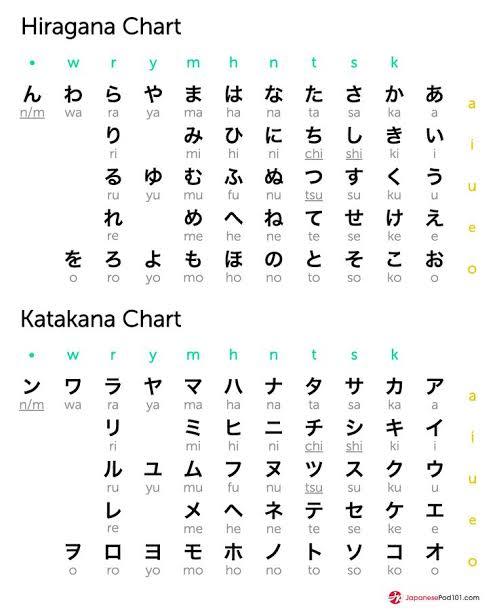
There's one video I randomly found on my feed that made me learn kana (katakana and hiragana) alphabets. I don't think I would've learned to read if not for this video because it makes the letters easily digestible:
youtube
Learning kana alphabets is unskippable. These two steps alone would help you to read shonen manga by yourself.
I'm specifying shonen because it's aimed at younger people so each kanji has reading aid texts called "furigana". Basically, each kanji's pronunciation is written in hiragana letters beside it. They bother when you try to scan the image but helps in manual reading.
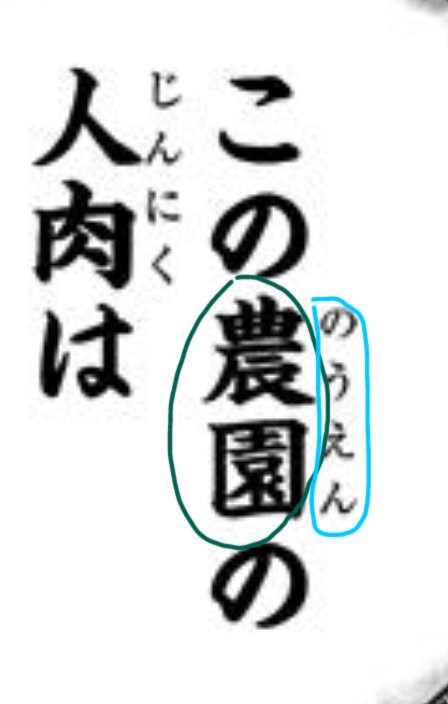
For example, you may not recognize (green text) 農場. But it has furigana (blue text) "のうえん" (no-u-e-n) written beside it, you'll recognize the word "nouen" from your vocabulary which means farm in Japanese. (page from The Promised Neverland manga, nouen is a frequently used word in the series)
3. Getting used to reading
After learning kana alphabets, as a beginner I used to work with pen and paper. I would write an entire sentence in English pronunciation first and then read the meaning. It helped me to separate each word (because JP doesn't have space between them.)
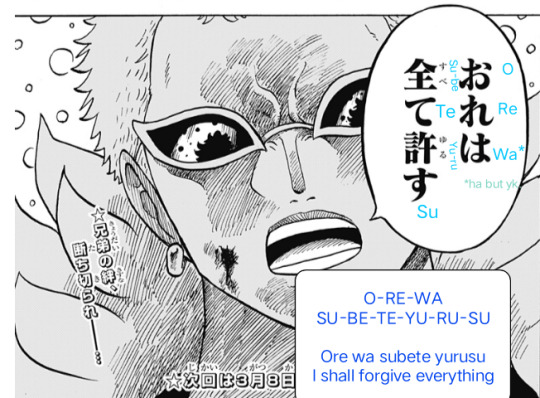
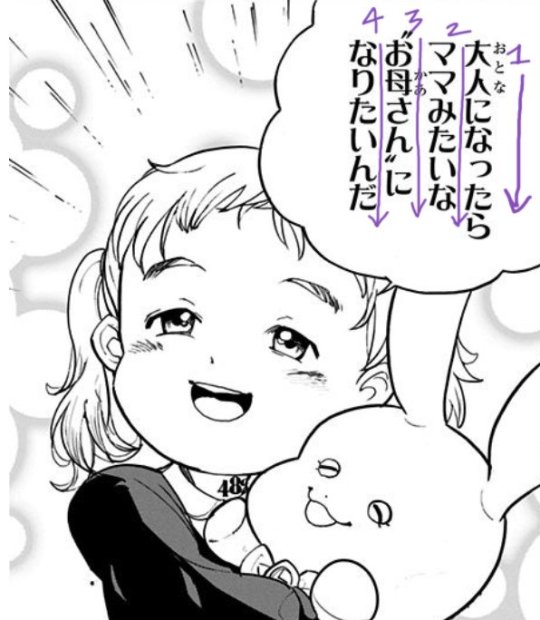
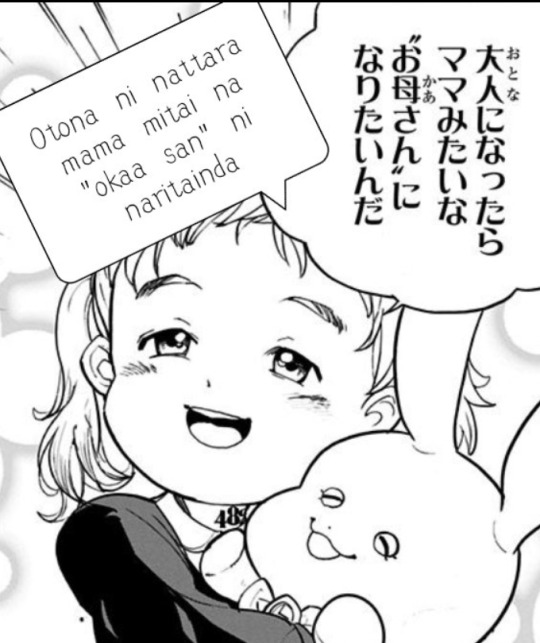
Sometimes I used to loudly read the English pronunciation for Google translate's speech recognition so it can translate the sentence for me.
Speaking of Google translate,
3. Applying Tools
Download Google translate app's old version (2020-2021 versions should be good enough) where you can scan a page, then switch off the app's auto update. It's an essential tool that (fortunately) works best for Kanji translation. If you're relying on auto translation, ignore furigana (the small texts) entirely, let it read Kanji.

Sometimes the scanning function can't distinguish vertical and horizontal texts. That's why learning to read by yourself is essential.
Now you're set, the rest is up to practice! When you start learning you'll want to read more to test yourself. And when you read, you get better. Hopefully you'll be able to read hand-written texts and recognize frequently used Kanji after practicing.
The complex/formal sentneces can easily translated via Google translator/DeepL/ChatGPT. But they need some human assistance. Without context they can't correctly interpret pronouns and sometimes you have to cut a bulk of texts into smaller parts.
A manga translation doesn't need to be 1:1. Recently I'm more flexible to suit a sentence closer to natural English than sticking to literal meaning. My English isn't the best either so I have to compensate 🤧
48 notes
·
View notes
Text
If you're serious about learning a language, I am begging you to not use duolingo.
More nuance:
Don't use duolingo as your primary study tool. You can use it for exercises and extra practice, but pick something else for your main study resource. (So if you only want tourist language to visit a place then get a travel phrasebook. If you want to be able to speak on everyday routine stuff with people then practice dialogues - like Assimil, Teach Yourself Books, Coffee Break Language X podcasts, Pimsleur. If you want to be fluent - read, write, listen, speak the language on most topics to at least a general level? Then get a textbook, or visit a free online grammar guide, or free online lessons like on youtube, or free college courses on Coursera, or literally start DOING the thing and looking up words you need - so speak to someone on a language exchange app and look up how to say what you want/look up the words they say, or read a book/online text and look up unknown words and grammar, or listen to audio/a show and look up words/grammar, or pick a topic to write on and look up words/grammar you're trying to write. So basically: use a more thorough resource that will teach you thousands of words and at least up to upper intermediate grammar points).
The thing is... duolingo CAN be a beginner's primary study tool, and for particular languages where the duolingo course is very expansive, it can teach you 3000+ words and get you to upper beginner/lower intermediate in a language. After which point, you can move on to intermediate textbooks, or courses, or DOING the activity in the language and looking up what you don't know. If you do a duolingo course with only 1000 words, that's very sparse, then you'll still need to go find another beginner study resource later. But if it's your first time studying a language then you are probably going to waste a lot of time on duolingo. That's why you shouldn't use it. Because you will NOT learn a language in a timely manner, if you're using duolingo for 15 minutes or less per day. If you study on duolingo for 1 hour or MORE per day? Then yes, you might get through a duolingo course in 1 semester's time to 1 year, and you'll see significant progress, and then be able to move onto other learning materials afterward. But duolingo does not market as if it's encouraging you to use it 1 hour per day, and the lessons are slow so if you find yourself bored or annoyed and go through them even slower, then it may require even more time per day to see noticeable progress.
Also, there are clearer explanations in other learning materials outside of duolingo. If you ARE going to study 1 hour a day, there's textbooks/courses/youtube videos that will explain grammar patterns immediately so you're not guessing what the fuck conjugation to do for each new verb in each new situation. There's going to be pronunciation guides you can complete in 1 hour or less, just listening to the language sounds, so you don't feel like new sounds in a sentence are coming out of nowhere. There's going to be free and paid resources tailor made to teach you a new writing system (like chinese, japanese, or russian) so you're not just staring at duolingo sentences trying to figure out how the fuck the writing system works. You can study japanese hiragana and katakana in 1 day to 1 month on a free app or youtube video or chart specifically designed to explain each pronunciation and give you a mnemonic story to remember that pronunciation and link it to the shape. If you're trying to learn hiragana and katakana primarily through duolingo sentences, it's probably not something you can tackle quickly and understand clearly in a few days.
Duolingo lessons are a lot like randomly stumbling upon a sentence collection on a random website, and looking up 1 word at a time, and trying to figure out how a language works based on doing that over and over and over. It is doable, especially if the particular sentences TEACH YOU ENOUGH WORDS and GRAMMAR (so more expansive duolingo courses like Spanish course are better). But if you were going to learn that way... you could just pick up a book/online articles/video game script/show subtitles you actually want to understand, and start looking up words in each sentence, piece by piece, and go through it. At the least, you would learn words relevant to what you want to understand IMMEDIATELY. Whereas duolingo may teach you apple and bear, and take months to teach you 'body, health, sick' when maybe you only wanted to learn Spanish to read about healthcare treatment since you're trying to use the language for work or something. Will studying duolingo work? Sure, provided you study it enough time per DAY to get through the duolingo course in a timely manner. And provided you recognize if a duolingo course only has 1000 words, you STILL need to go study another beginner resource afterward before you'll be able to do much in the language.
But is it the best option? No. Most languages have much better designed resources, and a variety of designs, so you can go find the perfect resource to study from that's best suited to how you learn and what your goals are. There's also plenty of other free resources, and just learning by DOING and looking words up (which is similar to how duolingo teaches you, but may allow you to learn what's relevant to your goals quicker than duolingo).
But is duolingo the best option for beginners? No, absolutely not. I honestly think the best option for beginners is a textbook, or a free online lessons site, or a free Coursera course. Just because a beginner... should get an idea of how long other people typically take to learn beginner material, how much beginner material there is to learn (what grammar and words should a person learn to get through beginner level), and what they can expect to be able to do once they learn the beginner stuff. (I like Teach Yourself books, not even to use necessarily, but to look at free in a library and see how many words they teach, grammar they teach, exercises they offer, and skills a learner should be capable of when done - as the Teach Yourself books are a bare bones example of what a beginner can aim to learn and can be a good guide for what to pick to 'self study' if you're finding a bunch of study materials on your own. Most languages also have textbooks that tend to be recommended, and those are also good guides of what a beginner should aim to learn/what other learners tend to learn by the end of the first 1-2 years).
What if the gamification of duolingo REALLY motivates me? Okay... if you can't find any OTHER app that teaches MORE and is also gamified in a way that motivates you, then go for duolingo. Just remember, if you want to learn a language in something like "4 years" or less, you need to get through the beginner material duolingo has in a timely manner. So that will probably mean using duolingo 1 hour a day (or more if you have some intense goal like learn X in a year). If the gamification of duolingo motivates you a ton, and more than other apps, I would suggest just looking up how many words are in the duolingo course you're studying. If it's something like Spanish, then the duolingo course has enough that even 2-3 years to complete the duolingo course is probably good ordinary speed of progress. If it's something like Ukrainian (a little over 1000 words), then you'll probably want to complete the duolingo course in a year or less, then complete some other upper beginner learning material in the next 6 months to a year. So if the duolingo course has few words, and gamified apps motivate you, then you may want to search for another gamified app that teaches a few more thousand words to use after duolingo. (Maybe Clozemaster if it has enough words for your language, maybe anki and user-made decks if anki motivates you, maybe glossika, etc).
#rant#duolingo#does it work? it works if you put the study time in#but its not the clearest resource in terms of explanations so beginners may not find it as useful as other stuff
4 notes
·
View notes
Note
🌐,💻,👾
🌐 Languages you can speak and/or are learning. Which are you fluent in
peak colonial empire country moment. I speak English. I have high school french and some beginner japanese, both of which i have way too much social anxiety to speak in in public.
💻 Desktop/Laptop/iPad/other
laptop, with an sneaky extra screen if possible! but laptop for being curled up on my couch just generally
👾 Do you believe in aliens
hmmm. not in an x-files way. but I do think it's pretty narcissistic to assume earth is the only planet in insane numbers of galaxies that supports some form of life. i like to imagine there's little guys on at least one other planet, somewhere. they just might not be life as we recognise it, and we'll probs never see them.
lil personal quiz time!
4 notes
·
View notes
Note
Hi! How did you learn to read Japanese? If I'm not wrong that you do, is the Japanese depiction of the GW characters' personalities different from their Western depictions?
Hey! Learning how to read Japanese is definitely an adventure in and of itself. For me, I had learned how to read and write hiragana and katakana from the Yoshida Institute’s site long before smartphones existed, along with a few kanji. I would use hiragana for my cheat sheets at school. (Yes, I learned a whole different alphabet just to cheat at history and geography instead of simply studying for my exams like a sensible person, even though I realized it was way more effort. I'm not exactly smart.) I started learning kanji properly years later with the kanji learning app Japanese Kanji Study, which I can't recommend enough, then took a brief language course and then accidentally ended up studying Japanese in college for 1.5 years, which is where I learned all my beginner's grammar (みんなの日本語 anyone?) and, as is totally apt for a beginner, hentaigana.
It’s funny when you can't string five sentences together without issue, but can make out Nobunaga's scribbling, something many natives are incapable of. Great, balanced education you thought up there, folks.
At least I got a laugh out of one Ranma ½ episode where Ranma found Kuno’s journal entry and couldn’t read it because of course that doofus would write it in the most archaic manner possible.
Anyway, as far as reading aids go, I’m just gonna plug everything I’ve used over the years for anyone interested. The Firefox extension 10ten reader has been a lifesaver, as has been Jisho. When it comes to comprehension, Google translate is dog crap. I’d recommend Papago, which must have been trained specifically on East Asian languages as the results are much better. Not perfect, but better in my experience. Google translate has long incorporated OCR (image to text) so it may be less useful, but I’m very fond of the no-install Capture2Text which can convert manga speech bubbles to text, provided the scans are clean enough to read the kanji.
For grammar, I stuck to Minna No Nihongo. Bought all the books and slowly work through the lessons now.
The most valuable asset though is having a fluent or native speaker you can ask. Nuance is impossible to grasp if no one explains it to you. Even with vocab, you’ll run into plenty of words with the same meaning. Dictionaries often don’t distinguish in those cases. Having someone you can ask makes learning a lot easier.
Now for the Gundam Wing part of your question.
I’m not exactly sure what you mean by Japanese and Western depictions, or rather who you mean. If we’re talking official sub vs. dub then yes, there are a few differences. Heero isn’t perpetually constipated in the original (he actually has a sense of humor!) and Duo is a lot less flirty than his dub version. But it’s nothing grave. Certainly not Seto Kaiba levels of the dub rewriting his character to make him rant about not believing in destiny every time he opens his mouth.
Or Saber Rider being the leader of the Star Sheriffs. wtf I grew up with a lie D:<
Now, if you’re referring to fandom spaces, I am, without a doubt, the wrongest person to ask as I have never seen what the Japanese Wing fandom is up to and have never really been in touch with what the West is doing either. Have I seen fanfics and do I know 1x2 is the most popular ship? Yes. Have I spent 10 minutes looking at a manga panel, trying to figure out what is going on, only to hit the back button as fast as I could once I did? To the detriment of my poor eyes, yes. But when it comes to fandom differences, I think @muwi-translates could give you a proper answer. I can’t really say much as I’m not involved in the fandom in a way that lets me know such things.
I just sit here in my bubble, talking to myself most of the time.

18 notes
·
View notes
Text
Hello World! 🐾
For some reason, my original post disappeared all of a sudden, glad that I backup periodically.
Last updated: 2025-01-18
你好世界!Hallo Welt! Halo Dunia! こんにちは世界! 🇺🇸🇹🇼🇩🇪🇮🇩🇯🇵
I am Meowbrown, you can also call me 貓布朗.
Obviously, I’m a cat and I meow 🐾
I love brownies and languages.
#meowbrown for personal stuff.
#meownotes for my language notes.
#meowbook for curated content which I should be learning at the moment.
#meowfollow for langblrs I’m following because this is a sideblog. I’ll also follow with my main blog.
Quick links
Korean progress
Apps/sites for learning Japanese
2025年日本語の勉強ゴール
Why is this langblr for?
Talk to other meow friends
Organize notes and resources
Languages I meow
English (Fluent)
中文 (Fluent)
Bahasa Indonesia (Conversational)
Deutsch (B1)
日本語 (probably N3)
한국어 (Super beginner)
5 notes
·
View notes
Note
hey sorry to bother you but do you have any recommendations for learning chinese? I've gotten my feet wet before but never a firm grounding
The thing is I don't have a lot of great recommendations for beginners because when I started learning in earnest I was already very fluent in Japanese :o
14 notes
·
View notes